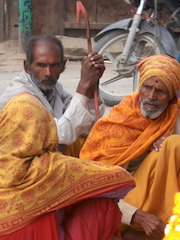OBEY, Charlie Brown
5 minute read.
This is the history of hope, happiness, and politics. It starts with the caste system in Nepal and ends with how to recognize truthful hope.
The caste system
and learned that Nepal was recovering from a ten-year civil war, had a new democracy, and would be voting for the second time in their history.
All over Nepal, people hoped for a better life from their new democracy. They discussed life, religion, and politics near temples while street-workers sewed strands of flowers.
The flowers were purchased by people on their way to or from work, who would leave them at the temple as offerings. They did their duty, and helped the person selling flowers do their duty. This exchange dated back thousands of years, and is how the caste system views work.


In the caste system, you do the work your father did, who did the work of his father. Your children will do your work.
You can not marry outside of your caste. Your name includes the work you can do.
You hope that by doing your duty you’ll be reborn into a higher caste.
The caste system has been Hindu doctrine for almost 4,000 years, and was Nepali law until recently. But, Nepali people still obey the rules of their former caste system.


OBEY!
An American graffiti artist became famous by swapping “Obey” with “Hope,” leading to a presidential campaign poster.
His Obey logo became a popular clothing line. To be inexpensive, clothing was made in China, which borders Nepal and provides most of the cheap clothing worn by lower castes.
Over the next month, I saw people use the OBEY brand to keep warm as they persevered through manual labor, tedious tasks, and shoveling human waste. All came from families of the lowest castes. Despite the caste-system being illegal, their suffering persists. They hope for change, which was exploited as justification for a civil war while people continued doing their work.





Hope
The Greek gods tormented humankind by giving us suffering in Pandora’s Box. They put Hope in the box, too, because hope prolongs suffering. False hope is what keeps a boxer fighting when there’s no chance of winning, taking punch-after-punch while spectators watch.


Many people misinterpret hope as something positive, but hope was made attractive to entice us. Greek writers warned us about hope and fruitless effort with Sisyphus, who is still being punished by the gods. Each day, Sisyphus carries a rock uphill, hoping he’ll reach the top. Every evening, it rolls back downhill. The gods don’t need prisons; Sisyphus obeys his gods because he has hope.
Hope & Change
Charlie Brown has been hoping to kick a football held by Lucy since 1950. He misses because Lucy intentionally moves the football. Millions of fans know he won’t succeed but enjoy watching him try; we are Charlie Brown’s gods.

The creator of Peanuts sent a message to society for 50 years. He used the words “Hope!” and “Change!”when satirizing politics; those words are still used by politicians today, and we still continue to believe in false hopes.

Modern Sisyphus

Politicians use our desires to their advantage, promising hope, change, and to make things great again. We then obey their rules, wars, and calls for a stronger economy that do not bring more happiness.
Hope keeps us trapped. We don’t enjoy the present moment because we hope for a better job, more money, better possessions, and more happiness.
We send our kids to school, not be happy in the moment, but hoping they learn skills that will get them a job that will make them happy, one day.
To be free from the trap of false hope, seek truthful hope.
Truthful hope
There are differences between false hope and truthful hope:
False hope speaks to our desires; truthful hope speaks to our intellect.False hope speaks about the future; truthful hope begins with the present moment.False hope gives goals without a practical path; truthful hope has small steps, with each step being an incremental improvement.

This isn’t new: 2,600 years ago Prince Siddhartha Gautama rejected the caste system in Nepal and India, teaching people to avoid extremes by following the middle-way. His teachings became Buddhism, the world’s 4th largest religion, not an external deity or god, but on human intellect. Siddhartha’s advice was:
“Each day, do more of what you know to be wholesome, and do less of what you know to be unwholesome.”
To do more of what’s wholesome, seek truthful hope that applies to your unique situation in life. Be mindful of each moment, aware of your thoughts and motivations; do not be swayed by politicians, advertisements, or situations that speak to desires rather than intellect. Plan for the future, but don’t become attached to it. View life as an adventure where nothing’s certain except the present moment. At that point, you’ll be able to look at the promises of hope and change objectively, to see them for what they really are, and you’ll know what to do to escape the cycle.
When there is no desire, all things are at peace. – Lao Tzu
I’m making this up as I go. – Indiana Jones

Peace.
JiP

